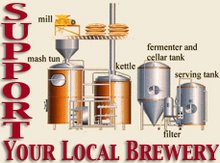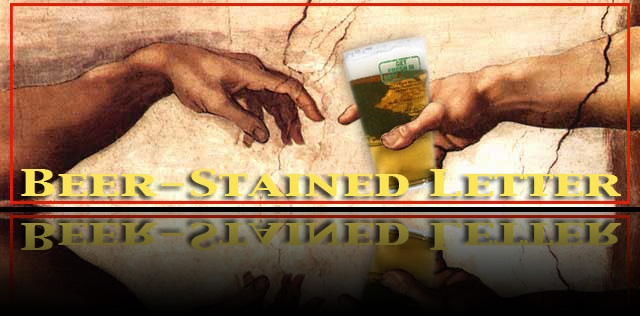Big Brew Trifecta: 3 Q&As with Beer People
EDITOR'S NOTE: In observance of Big Brew and National Homebrew Day, Beer-Stained Letter has a trio of Beer People/Beer Life Q&A features: Talks with longtime homebrew figures – Joe Bair and George Hummel of Home Sweet Homebrew in Philadelpia – and an interview (posted Thursday, May 3rd) with Matt Brophy, the brewmaster and chief operating officer of Flying Dog Brewery who, like a lot of pros, entered the business via homebrewing ...
 | |
| Joe Bair (left) with Ryan Hansen of PALE-ALES |
When Triumph Brewing opened its doors on Nassau Street in Princeton as the state's second brewpub in 1995 (the Ship Inn up in Milford edged out Triumph for the lead), Ray Disch and Adam Rechnitz quickly had a new neighbor, someone who would encourage folks to not just drink better beer, but to make their own.
At the urging of his friend, Mark Burford – then owner of New York Homebrew, but better known now as the guy behind Blue Point Brewing on Long Island – Joe opened Princeton Homebrew, turning his back on his job at Princeton University doing administrative work in molecular biology and putting his life savings on the line.
Craft beer back then was just starting to get a foothold in the mid-Atlantic region, and the annual of observance of National Homebrew Day was but 7 years old. Fast-forward to now: The American Homebrewers Association estimates there are 750,000 homebrewers in the US, and paid AHA membership has topped 30,000.
Come Saturday, homebrewers will again gather at locations all across the country for their annual simultaneous day of brewing – the Big Brew.
As for Joe, on Saturday you'll find him at his shop, now on Route 29 in Trenton, turning out Big Brew batches of wort for the homebrew club PALE ALES (Princeton and Local Environs Ale and Lager Enthusiast Society), whose members will gather at Suydam Farm, in nearby Somerset County.
Across the state, you'll find like-minded homebrewers celebrating: North Jersey Home Brew and Sussex County United Brewers and Alchemists in Sparta; Barley Legal Homebrewers in Maple Shade; and Cask & Kettle Homebrew with the guys from Final Gravity Podcast in Montville. That's just a short list, the ones registered with the AHA Big Brew website, but there are doubtless more.
------
BSL: What was it like in early on, the business of encouraging people to make their own beer?
JB: I think about that all the time – how I sold then to how I sell now. Back then, I thought the whole process to selling homebrew (supplies) was to set up some really good, slick learning thing where you show people all the stuff you need and walk 'em through, and they buy a kit. That was a good formula in the beginning.
BSL: What attracts people to homebrewing? Is it different now vs. when you first opened?
JB: Everybody is forgetting that most of the reasons why people homebrewed back then was we had shit beer. It was horrible. It was embarrassing to say you came from America. Lowenbrau and Heineken or something like it were considered fantastic. Now, those are more swill. But back then, anything but American beer.
 BSL: Homebrewers, especially beginning ones, are hell-bent on making their beers better as fast as they can. It's almost like a race to get to refinements and brew a great beer. With all the information available now, are people are getting to that finish line faster?
BSL: Homebrewers, especially beginning ones, are hell-bent on making their beers better as fast as they can. It's almost like a race to get to refinements and brew a great beer. With all the information available now, are people are getting to that finish line faster?JB: If everybody stoppped brewing because they had a bad batch of beer, there'd be no beer. Everybody's had a bad batch of beer. Hey, get used to it, Join the club ... You have to get over all these things. Sooner or later, you get really good at it, and you meet other people who are just starting and they go through the whole thing.
BSL: Do you think nowadays people hit that point of embracing and actually enjoying all of the finer brewing details, like the science stuff vs. just basic procedures, faster than say folks did back in the 1990s, when the hobby was first getting some traction around here?
JB: Right now – and it's been this way since at least around 2000 – people, instead of looking at brewing as something that's laborious, everything that they look at is interesting: Do this because it's interesting, understand this because it's interesting, which is a lot better way of doing things – finding fascination, doing things the right way, understanding things.
Most of the people around here, when they started brewing, we started them off with adding their own grains, their own hops ... and they didn't even realize it. They're being kind of pushed along in a very gentle way to start paying attention to things like temperature, to start paying attention to putting your own hops into recipe formulation, things like that, that you would not get from just opening up an already-hopped can of something.
Sooner or later you're making your own recipes. You don't have to look at any other brewer's recipes. You can make your own. You can make your own equipment. Most of this stuff is just a lot of plumbing.
BSL: Talk about some of the brewing tricks, now vs. then.
JB: I remember dry-hopping was something that people would say Oh?!?!? That was like getting out there, putting an ounce of hops in your secondary was Wow, that's advanced brewing. But now, with dry-hopping, they're saying put it in five hours before bottling it, you'll get better results than putting it in two weeks.
BSL: Hops, all the new varieties, seem to be the bright shiny object that can quickly grab homebrewers' attention these days. There's way more available to today's homebrewer than before ...
JB: When I opened my store, Pride of Ringwood at 7.8% was the highest alpha hop I sold ... Then they came along with Centennial ... all of a sudden there's another hop, like Hey what's this, Nugget? There's always something new that comes around.
BSL: With the Internet, people can shop anywhere. But isn't a local shop -– an actual store – a nexus? People in a store talk to one another, and that creates a buzz. That's as much an ingredient in beer as barley, no?
JB: I've never heard it put that way, but yeah. It helps people to have tangible personal relationships ... that they can come in and ask 'What did I do wrong?' or 'How do you go about doing this or that?' It's very hard to translate that to the mega Internet beer supplier customers. They say go to Homebrew Talk and learn from this. You're not getting directly to somebody who knows; you have to filter out the stuff. (In some cases) you have people who've brewed one or two batches of beer in their life giving instructions to other people, like you don't need to do secondaries, or cut the tube off on the bottom of your Corny keg ... There are so many things that are out there. It tends to amplify, the Internet, some of the things that are wrong.
BSL: Homebrewers have long fed the ranks of pro brewers. What do you make of the latest industry growth wave, those polished homebrewers who went commercial by stepping into the game at the very, very small scale, like a barrel or two?
JB: Back before prohibition, there was an outrageous amount of breweries in every single town. Everything works on a big sinusoidal curve. We start at one place, it appears we're moving forward, and we go small to large, large to small.
When I opened my business, they asked me to prognosticate the future (of brewing). I said that any town that's a town will have a brewery in it. When I said that back then, people were going like, What!?!? And now I would say any community that's a community will have its own brewery. And that's the way it looks like it's going, and I think that big sinusoidal wave is back.
The big, huge mega brewers ... for a long time people were saying they're a good American company. What's the Super Bowl without an Anheuser-Busch commercial? They're on the down slope; they're not on the up. They're not even an American company anymore. They pushed this whole thing – you want beer, you drink beer – and it was one style, pale lagers. It's changing. Microbrewers are getting more and more of a share; the homebrewers are getting more and more of a share. It's not that a whole bunch more beer is being brewed, it's that a whole bunch more smaller brewers are doing it .
BSL: What's the most exciting thing about homebrewing right now?
JB: I would say the homebrew clubs. When I started PALE ALES in 1995, there weren't that many homebrew clubs. Now there's a club being started it seems like every month.
BSL: Clubs nowadays appear better organized, more ambitious.
JB: It took awhile for our club. Some people wanted to do it for charity, others peple would say, Hey, I'm here drink beer, I'm not here to do charity. There were some people who said, Hey, we need more brewing. Everybody had their own little way the club was supposed to go.
Now there are competition clubs; there are clubs that just meet at the same place, clubs that go around to all the different breweries or different bars; there are clubs that have speakers (such as) distributors, water people, the basic ingredients of beer, bar owners ... There are so many different facets to the whole thing.












1 comment:
Great interview with Joe Bair. Truly one of the best of the best, and a great and knowledgable guy to boot.
Post a Comment